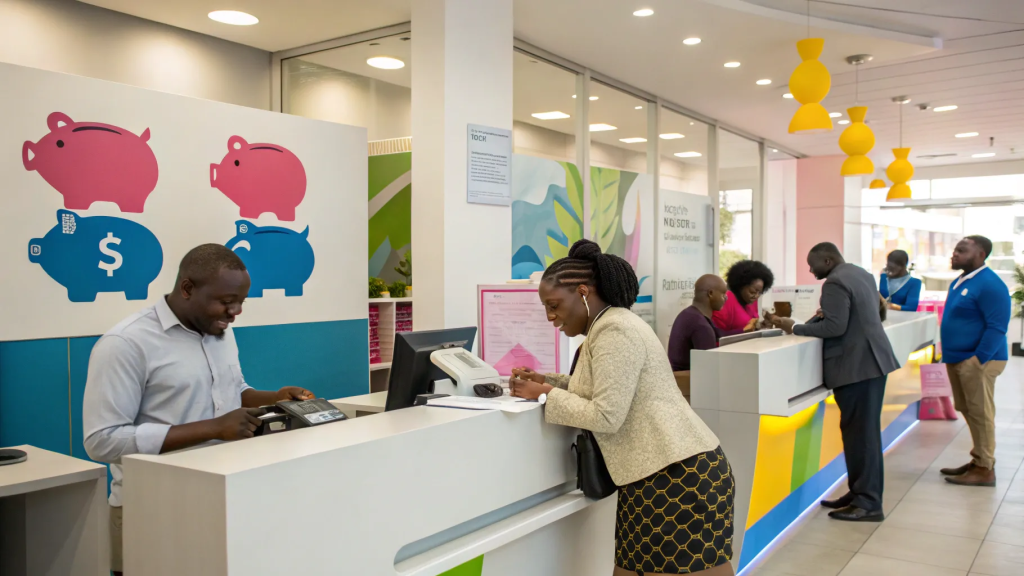Are you ready to open a bank account in Nigeria but unsure where to start? In this blog, we’ll break down everything you need to know about bank accounts and debit cards, making the process simple and straightforward. Let’s dive in and empower you to manage your finances with confidence!
Bank Account in Nigeria: a brief introduction
Opening a bank account in Nigeria is an essential step in managing your money. It provides a secure place to store your cash, pay bills, and make purchases. But before you jump in, it’s important to understand the different types of accounts available to you.
There are various types of bank accounts, including savings accounts, current accounts, and fixed deposit accounts. Each serves a unique purpose. For instance, savings accounts are ideal for stashing away money for future needs, while current accounts are perfect for daily transactions.
Why You Should Open a Bank Account in Nigeria?
- Security: Keeping cash at home can be risky. A bank account protects your money from theft.
- Convenience: With online banking, you can manage your finances from anywhere.
- Record Keeping: Banks provide statements that help you track your spending.
- Access to Loans: Having a bank account can make it easier to get loans or credit in the future.
Bank Account in Nigeria and Debt Cards: how does it works?
A debit card is a plastic card linked to your bank account. It allows you to make purchases directly using the money in your account. Unlike a credit card, a debit card doesn’t let you borrow money. It’s simply a convenient way to access your funds.
When you use a debit card, the money is deducted immediately from your account. This helps you avoid overspending, as you can only spend what you have. Plus, debit cards often come with additional features like cash withdrawal from ATMs and online payments.
Benefits of Using a Debit Card
- Easy Access: You can withdraw cash or make payments without carrying cash.
- Budget Control: Helps you stay within your spending limits.
- Less Risk: If lost or stolen, reporting it can prevent unauthorized use.
How to Apply for a Debit Card after you get your Bank Account in Nigeria?
Applying for a debit card is a straightforward process. You can usually do it when you open a bank account. Here are the steps:
- Visit your chosen bank or their website.
- Fill out the application form for a bank account and a debit card.
- Provide the required identification documents.
- Wait for your application to be processed.
Required Documents
To successfully apply for a debit card, you typically need:
- A valid form of identification (e.g., national ID, driver’s license).
- Proof of address (e.g., utility bill, tenancy agreement).
- Passport-sized photographs.
Bank accounts in Nigeria: Requirements for Minors
If you are under 18, you can still open a bank account and get a debit card, but there are specific requirements. Most banks will require a parent or guardian to co-sign the application.
Here’s what you need:
- A birth certificate or any proof of age.
- Identification for your parent or guardian.
- Consent from your parent or guardian to open the account.
Understanding Transferable Accounts
Many banks offer transferable accounts for minors. This means your parent or guardian can manage your account alongside you. They can transfer money in and out, and they can also see your balance.
This feature is beneficial, but it’s crucial to choose a trustworthy guardian. You want someone who will respect your funds and not withdraw money without your knowledge.
Funding Your Bank Account in Nigeria
Once you open a bank account in Nigeria, you’ll need to fund it. Here are common ways to add money to your account:
- Cash Deposits: Visit your bank and deposit cash directly.
- Bank Transfers: You can transfer money from another bank account.
- Direct Deposit: If you have a job, you can set up direct deposit for your salary.
Using Mobile Banking Apps
Most banks in Nigeria have mobile banking apps. These apps make it easy to deposit money, pay bills, and transfer funds from your phone. Just ensure you have a secure internet connection when using these services.
Using Your Debit Card for Purchases
Your debit card is not just for withdrawing cash; it’s also for making purchases. Here’s how to use it effectively:
- At the checkout, present your card to the cashier.
- Choose whether to run the transaction as debit or credit.
- Enter your PIN if prompted.
- Request a receipt for your records.
Cashback Options
Some stores offer cashback when you use your debit card. This means you can withdraw additional cash when making a purchase. Just let the cashier know how much cash you want to receive.
Using your debit card wisely can help you manage your finances better. It’s a powerful tool for everyday transactions, and with proper use, you can avoid unnecessary fees and overdrafts.
Withdrawing Cash: ATMs vs. Cash Back
When you need cash, you have two main options: using an ATM or getting cash back during a purchase. Both methods have their pros and cons.
Using ATMs
- Convenience: ATMs are available in various locations, making it easy to withdraw cash when you need it.
- Withdrawal Limits: Most ATMs have a daily withdrawal limit. This limit can vary by bank and type of account.
- Fees: Be aware of possible fees for using ATMs outside your bank’s network. These fees can add up quickly.
Cash Back at Stores
Another option is to get cash back when you make a purchase. This method is great because you can avoid ATM fees.
- How It Works: When checking out, ask the cashier for cash back. You can choose the amount you want.
- Limits: Not all stores offer cash back, and there might be limits on how much you can get.
- Convenience: It’s a quick way to get cash while shopping.
The Importance of Knowing ATM Limitations
Understanding ATM limitations is crucial for managing your finances. These limitations can affect how much cash you can access at any given time.
- Daily Withdrawal Limits: Most banks set a daily withdrawal limit on ATMs. This means you cannot withdraw more than a certain amount each day. It’s important to know your bank’s limits to avoid surprises.
- Transaction Fees: Using ATMs outside your bank’s network may incur fees. These fees can be a fixed amount or a percentage of your withdrawal. Always check your bank’s fee structure to avoid unexpected charges.
- ATM Availability: Not all ATMs are available 24/7. Some may be located in areas that are unsafe at night. Always choose ATMs that are well-lit and secure.
Overdrafts: What You Need to Know
Overdrafts can be a major headache. They occur when you withdraw more money than you have in your account. Understanding overdrafts will help you avoid costly fees.
What is an Overdraft?
An overdraft happens when your bank allows you to spend more than your account balance. This can lead to negative balances and overdraft fees.
Common Causes of Overdrafts
Several factors can lead to overdrafts. Here are the most common causes:
- ATM Withdrawals: Taking out more money than you have can trigger an overdraft.
- Credit vs. Debit Transactions: Running a debit transaction as credit can delay processing, leading to overdrafts.
- Autopay Bills: If you forget about upcoming payments, they can cause overdrafts when they are deducted.
The Risks of Autopay
Setting up autopay can be convenient, but it comes with risks. You may not always have enough funds in your account when bills are due.
- Unexpected Charges: Autopay can lead to unexpected charges. If you forget about a bill or your account balance is low, you could end up with an overdraft fee.
- Loss of Control: With autopay, you may lose track of your spending. It’s easy to forget about bills that are automatically deducted, leading to financial surprises.
Final Thoughts of Bank Accounts in Nigeria
Managing your bank account wisely is key to avoiding overdrafts and fees. Here are some tips:
- Track Your Spending: Use budgeting apps to keep an eye on your finances.
- Set Alerts: Many banks offer alerts for low balances and upcoming payments.
- Consider Manual Payments: If you’re worried about overdrafts, consider paying bills manually.
Remember, opening a bank account in Nigeria is a step towards better financial management. Stay informed, make smart choices, and you’ll be on your way to financial success!
I have 13 years of experience in customer service at one of Brazil’s largest banks, including 5 years as a general branch manager. I am a specialist in banking products and services with a proven track record in team leadership and business development. I am also a holder of Brazilian certifications CPA-10 and CPA-20.



